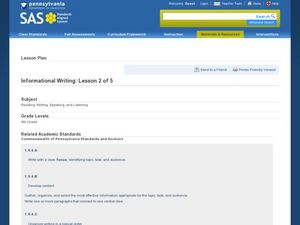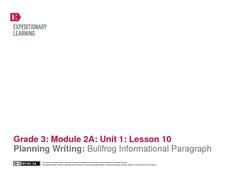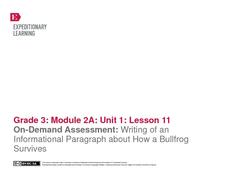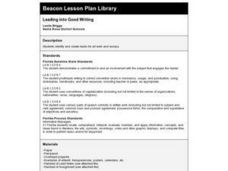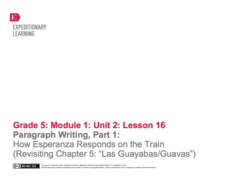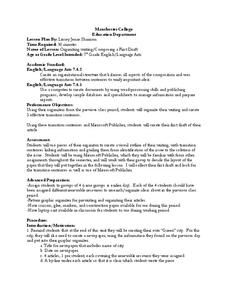Pennsylvania Department of Education
Informational Writing: Lesson 2 of 5
Introduce expository writing to your elementary learners. Young authors write a three-paragraph informational paper using the steps of the writing process. They follow guided lessons to experience each of five steps. Included are tons of...
Curated OER
Expository Writing (Informational Brochure)
Design an informational brochure to urge people to move to a specific community. The purpose of this activity is to expose pupils to expository writing. After creating the brochure, they write a three-paragraph persuasive or...
EngageNY
Planning Writing: Bullfrog Information Paragraph
Lesson ten in this unit for the book Bullfrogs at Magnolia Circle, prepares third graders to begin writing an informational paragraph about the adaptations of bullfrogs. First, young writers work either independently or in pairs to...
EngageNY
On-Demand Assessment: Writing of an Information Paragraph About How a Bullfrog Survives
Having read and discussed Bullfrog at Magnolia Circle, third graders demonstrate their bullfrog expertise by writing informational paragraphs. Building on the note-taking and paragraph planning from the previous lesson plan,...
Curriculum
Expository Writing
The beauty of the way this expository writing resource is structured is that the units can be presented as a complete writing workshop or sequenced throughout a course of study
Curated OER
Writing Lesson Plan: Homework Books
What a way to end the day! Class members recall important events that occurred throughout day. These events are posted on the chart board for class members to copy into their Homework Book. Books are sent home for parents to read, sign,...
Scholastic
Step-by-Step Strategies for Teaching Expository Writing
A carefully crafted, logically organized, 128-page packet is an excellent addition to your unit on expository writing.
Trinity University
Explain Yourself: An Expository Writing Unit for High School
Introduce expository writing with a unit that asks writers to craft an essay to explain a belief, value, or priority that is important to them. Mini-lessons within the unit focus on crafting thesis statements and conclusions, selecting...
K20 LEARN
Introduction to Expository Writing
Move beyond the five-paragraph essay with a lesson introducing young writers to various forms of expository writing. Class members examine description, cause and effect, problem solution, sequence, and comparison forms. They create an...
Curated OER
Leading into Good Writing
Discuss the importance of a lead in writing with your upper graders. They examine several examples of leads from literature and practice writing leads for pieces of artwork. They then select a topic from a list and write an introductory...
EngageNY
Paragraph Writing, Part 1: How Esperanza Responds on the Train (Revisiting Chapter 5: "Las Guayabas/Guavas")
When your class members have completed the novel Esperanza Rising, they will be ready to write an expository essay on how Esperanza responds to events and what this says about her character. Set your pupils up for success by...
West Contra Costa Unified School District
Expository Writing in Math
Pupils engage in an activity where one partner reads directions while the other follows those directions to complete a math task (such as bisecting an angle). As a reflection, they examine products to see what information the best...
Teachers.net
How to Write a Movie Review from a Pet's Perspective
When would two paws up denote a blockbuster film in your classroom? Only when young writers create movie reviews from a pet's perspective in this imaginative expository writing practice. This engaging topic begins with a class discussion...
Nancy Fetzer's Literacy Connections
Expository Paragraph
Upper elementary and middle school writers learn how to craft an expository paragraph by following the six steps detailed in a 48-page instructional guide. Learners learn how to write six different types of informational paragraphs:...
Curated OER
Working in your Cubicle: Critical Thinking and Writing
Explore informative and explanatory writing with this lesson. Using a cube labeled with directives to describe, analyze, compare, associate, apply, and argue the topic, middle schoolers work individually or in groups to answer questions....
Bright Hub Education
Using Evidence and Supporting Details in Writing
In expository writing, it is important to back up claims with evidence and details. Help your class to develop their writing with notes on different types of evidence. Once they have the basics down, practice with a sample thesis and...
Poetry4kids
Twenty Fun Writing Prompts for Kids
Twenty prompts reinforce scholars' writing skills of essays and poems. Prompts cover topics such as superpowers, holidays, the weather, and more!
Curated OER
Blogging to Create a Community of Writers #6: Writing a Review
Looking for a good social media instructional activity for your class? Then, this instructional activity is for you! They study various written reviews, then must choose an item to review of their choice. They can choose from: a book,...
Curated OER
Writing Process- Expository Writing
Expository writing is the focus of the language arts lesson plan presented here. In it, young writers review what expository writing is through a class discussion and teacher demonstration. Then, learners write expository text that...
Curated OER
Writing a Character Sketch
Combining descriptive and expository writing skills, middle schoolers create a character sketch about someone they know well. They use a graphic organizer to help them discuss a model character sketch and organize/write one of their own....
Curated OER
Organizing Writing/Composing a First Draft
Does your language arts class have a hard time with writing transitions? Use this organizational writing instructional activity to create three effective transition sentences that middle schoolers will use in their research of renewable...
Curated OER
Writing the Essay
Relate the structure of the essay to the structure of a building. The class compares an essay to a building, with the writer being the architect, the introduction being the foundation, and so on. They use the visual representation of a...
Overcoming Obstacles
Writing Reports
Following a review of how to research and take notes, scholars define the term paraphrase and identify ways to organize information and finish reports. To put their newfound knowledge to the test, learners interview a peer, take notes,...
Anti-Defamation League
Lonnie Chavis of 'This Is Us' Writes about Racism
Scholars read and discuss an essay by 12-year-old actor Lonnie Chaves about racism, paying close attention to how racism presents itself in interpersonal and institutional ways. Learners reflect on how they experience or witness racism...


